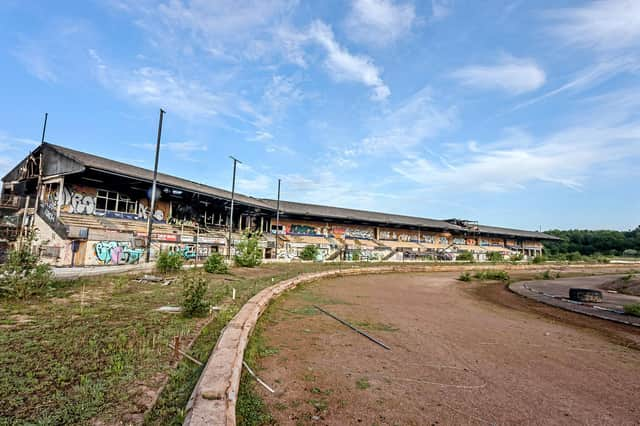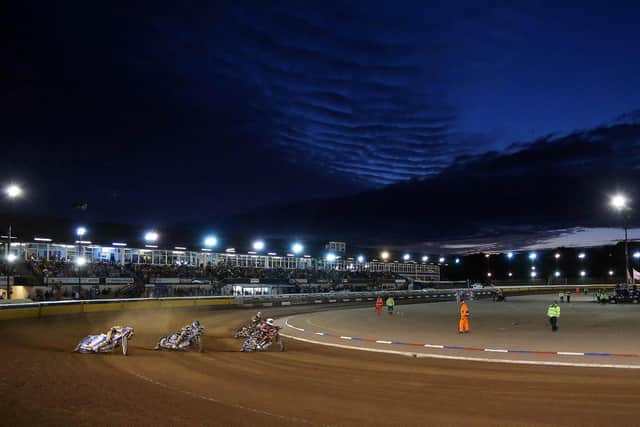Coventry Stadium planning inquiry: Brandon Estates accused of 'wilful neglect' of stadium


The company behind plans to replace Coventry Stadium with housing was accused of “wilful neglect” on day one of the planning inquiry that will decide the fate of the site.
Brandon Estates has appealed Rugby Borough Council’s refusal of planning permission for 124 homes, a 3G football pitch and pavilion at the derelict home of the Coventry Bees speedway team and former home of stock car racing.
Advertisement
Hide AdAdvertisement
Hide AdThe appeal will be heard by planning inspector Helen Hockenhull across up to nine days. Her decision then comes in writing, potentially weeks after the inquiry closes.


Inquiries are the most formal procedure by which planning appeals are decided with legal representatives cross-examining parties and expert witnesses to investigate evidence.
The senior lawyers representing the three parties – Brandon Estates, the council and Save Coventry Speedway and Stox (SCS) – delivered their opening statements on Tuesday.
Ms Hockenhull laid out the main bones of contention, including whether the new development would have a greater harm on the green belt, whether the stadium should be deemed as surplus to requirements, the financial viability of restoring the stadium, whether there is a need for the proposed 3G pitch and whether its inclusion would outweigh the loss of the stadium, plus consideration of other benefits including new housing.
Advertisement
Hide AdAdvertisement
Hide AdPeter Goatley KC, speaking for Brandon Estates, noted there had been no racing at the site since 2016 and said the viability of speedway generally “is severely challenged”. He later argued that “any need that might remain can be met from the several tracks which remain”.
He quoted a structural report from April 2023 which “confirmed significant concerns regarding the condition” of the stadium “which could not host any formal events without demolition and significant reinstatement", plus another report that estimated £13.7 million would be required for the facility to stage events in the same way it used to, assessing the prospect as “not feasible at any level”.
“The appeal proposals will deliver 124 dwellings, including much-needed affordable properties in a suitable and sustainable location, whilst providing an alternative sports and community facility, significant open space, biodiversity net gain and significant economic benefits,” he concluded.
“The benefits are consistent with the objectives of national, local and neighbourhood plans. Set against even the alleged harm, it is clear that the benefits of development are not outweighed.”
Hugh Richards KC presented the council’s view.
Advertisement
Hide AdAdvertisement
Hide AdThe main basis for the argument against the housing has always centred around a national planning policy that states “existing open space, sports and recreational buildings and land, including playing fields, should not be built on unless the development is for alternative sports and recreational provision, the benefits of which clearly outweigh the loss of the current or former use”.
Mr Richards argued this point should not be intertwined with the question over viability and that Brandon Estates should be held responsible for the condition of the stadium.
“In that context, it would appear that the focus should not be on reinstating the speedway stadium, rather recommencing use of the stadium for sport and recreation,” he said.
“There is plainly an issue as to what matters or works are necessary to get racing going again. Further, as far as the physical condition of the stadium or land impacts on viability, it has deteriorated as a result of the appellant’s wilful neglect which caused the council to take legal action to remedy.
Advertisement
Hide AdAdvertisement
Hide Ad“Plainly, the appellant cannot be allowed any credit in the planning balance on this count.”
He offered no challenge over the green belt issue but questioned the 3G pitch.
“The real issue is whether this is the right place and scheme to meet that need. Most key stakeholders do not think so,” he said.
He concluded: “In the opinion of the council, the benefits of the scheme do not collectively amount to material considerations that indicate a different outcome so the appeal ought to be dismissed.
Advertisement
Hide AdAdvertisement
Hide Ad“SCS and its supporters ought to be given the opportunity to bring back racing to the stadium site.”
SCS successfully applied to be a rule six party, which means they have equal footing, and Richard Humphreys KC pulled no punches.
He detailed how the land had been “openly marketed in 2013, primarily as a residential development opportunity” and that Brandon Estates held a public exhibition over plans to build 250 homes there in 2014.
“The appellant plainly, from the outset, had no intention of continuing the stadium’s use for racing other than in the short term whilst it progressed its plans for residential development," he said.
Advertisement
Hide AdAdvertisement
Hide Ad“Indeed, an indication of the appellant’s mindset is provided by the view expressed in March 2017 that it was ‘almost certain’ that an appeal would be successful."
He went on to detail how stock car racing was stopped, the failure of the site owners to take out building insurance prior to vandalism and arson attacks and inaction over security on the site leading to the council bringing criminal proceedings.
“Given the very protracted period of time over which these failures occurred, the appellant’s intentions for the site and the mindset referred to, it is reasonable to infer that the neglect was deliberate,” he said.
“Since the convictions, it appears the site has been properly secured. Neglect involving the commission of a criminal offence should not be rewarded by the granting of planning permission.”
The inquiry's running order shows evidence is set to be heard on green belt and sport-related issues on Wednesday.